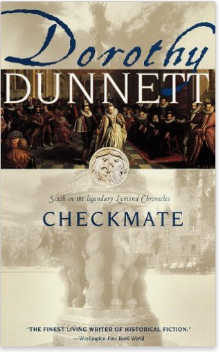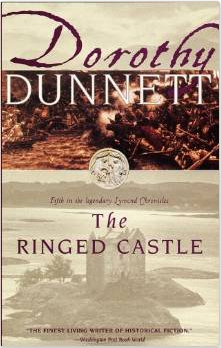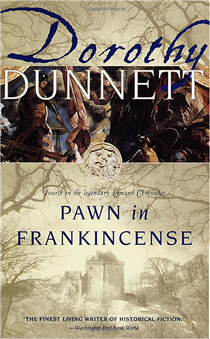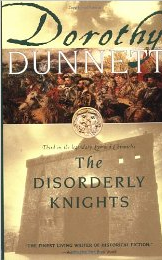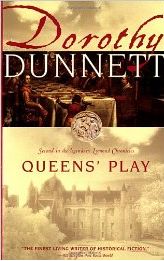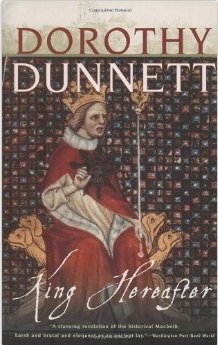 Best Book of the Week!
Best Book of the Week!
What most of us know of Macbeth, King of Scots, is taken from Shakespeare, from a play he wrote in honor of King James I of England. It is perhaps no coincidence that James I was a descendant of one of Macbeth’s enemies. King Hereafter presents an interpretation of Macbeth’s life from the master of historical fiction, Dorothy Dunnett, herself a Scot. You may well imagine that the Scots have a different version of the story than did the English and Shakespeare.
For some way into this novel, you may wonder when Macbeth will even appear, for it begins in Norway with a Viking and his foster son. Thorkel Admundason has left his foster son Thorfinn in Moray with his stepfather Findlaech for a few months while Thorkel attends the Norwegian court. Thorfinn is one of what had been three earls of Orkney—Thorkel recently killed one of them and is at court to learn his punishment. But Thorkel soon hears that Brusi, the other earl, has arrived to complain to the throne that Thorfinn has demanded half of the islands from him.
Thorkel is angry at the behavior of his 13-year-old foster son, who may have gained what he wanted if it was approached another way. In the end, not only does Thorfinn not receive more of Orkney, but he is forced to pledge himself as King Olaf’s vassal.
Thorkel has almost broken with Thorfinn entirely when he learns why Thorfinn fled to Norway. While Thorfinn was in Moray with his stepfather, Findlaech was burned to death in his hall by his two nephews. Thorfinn ends their conflict by begging Thorkel to teach him to think like a man.
Of course, Thorfinn is the young Macbeth, or rather Macbeth is the Christian name he takes later. In Thorfinn’s time of the 11th century, Christianity was not widespread in northern Scotland.
Thorfinn straddles cultures and religions. He is mostly of Celtic descent and was raised partly in his Celtic stepfather’s house, but as an Orkney man he is a Viking. He eventually comes to rule an area incorporating Scots, Norse, Irish, and Saxon subjects. He must speak Gaelic, Norse, and Saxon to rule them.
By the time his grandfather Malcolm, King of Alba, dies, Thorfinn is ruler of part of Orkney and of Moray. He has avenged his stepfather’s death by burning his enemies and has consolidated Moray by marrying Groa, the wife of one of his victims.
However, only when his cousin Duncan, by that time King of Alba, attacks Moray in an attempt to take it from Thorfinn does Thorfinn fight and kill him. With Alba part of Thorfinn’s dominion, he realizes he must learn to rule differently, to try to make of the entire territory of Scotia something resembling a nation instead of a collection of settlements with no towns or roads.
Fans of Dorothy Dunnett’s other novels will not be surprised at the meticulous research that went into this novel. Nor will they be surprised to find that Thorfinn is immensely capable and intelligent but frequently misjudged. This novel is wide ranging in scope, as Thorfinn masters the politics of Europe and struggles with the various intrigues between the Irish and Latin churches. For he must decide which religion will unify his people and serve them best.
Since Dunnett is a master of characterization as well as historical detail, the novel is full of vibrant characters. Thorfinn at first merits the respect and eventually the love of his followers. He has a handful of friends who are important characters. Although they misunderstand each other at first, he eventually enters into a deep love and partnership with his wife Groa.
No witches are part of this novel, but there is Luloecen, his stepson with second sight. He tells Thorfinn his fate very soon upon meeting him.
Yes, the woods of Dunsinane play a pivotal part in the plot. If you enjoy historical novels that are rich in detail and steeped in their time period, you will like this book. Like all of Dunnett’s novels, it is complex, yet full of excitement and adventure. King Hereafter is a clever, romantic, and intricately plotted novel.





